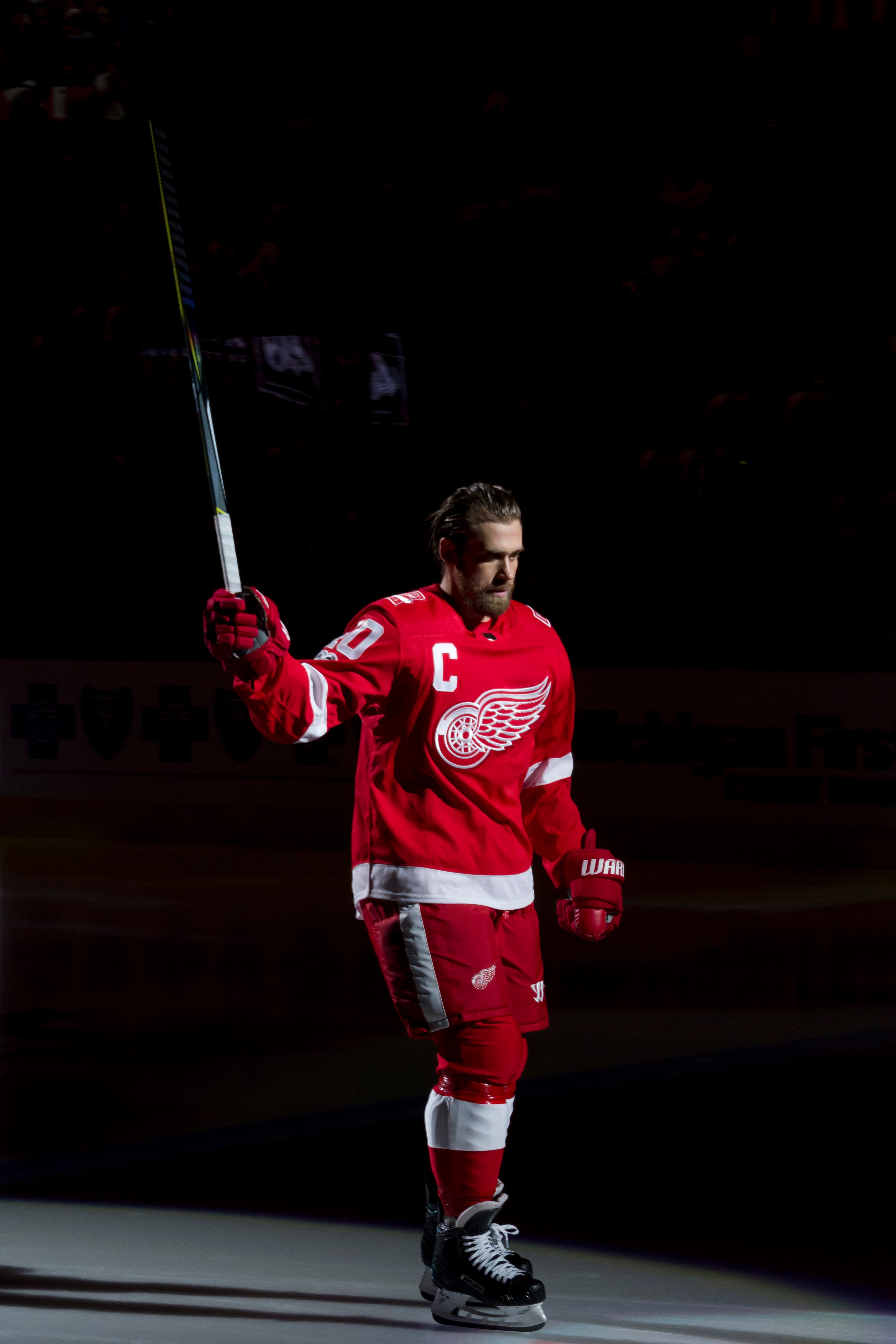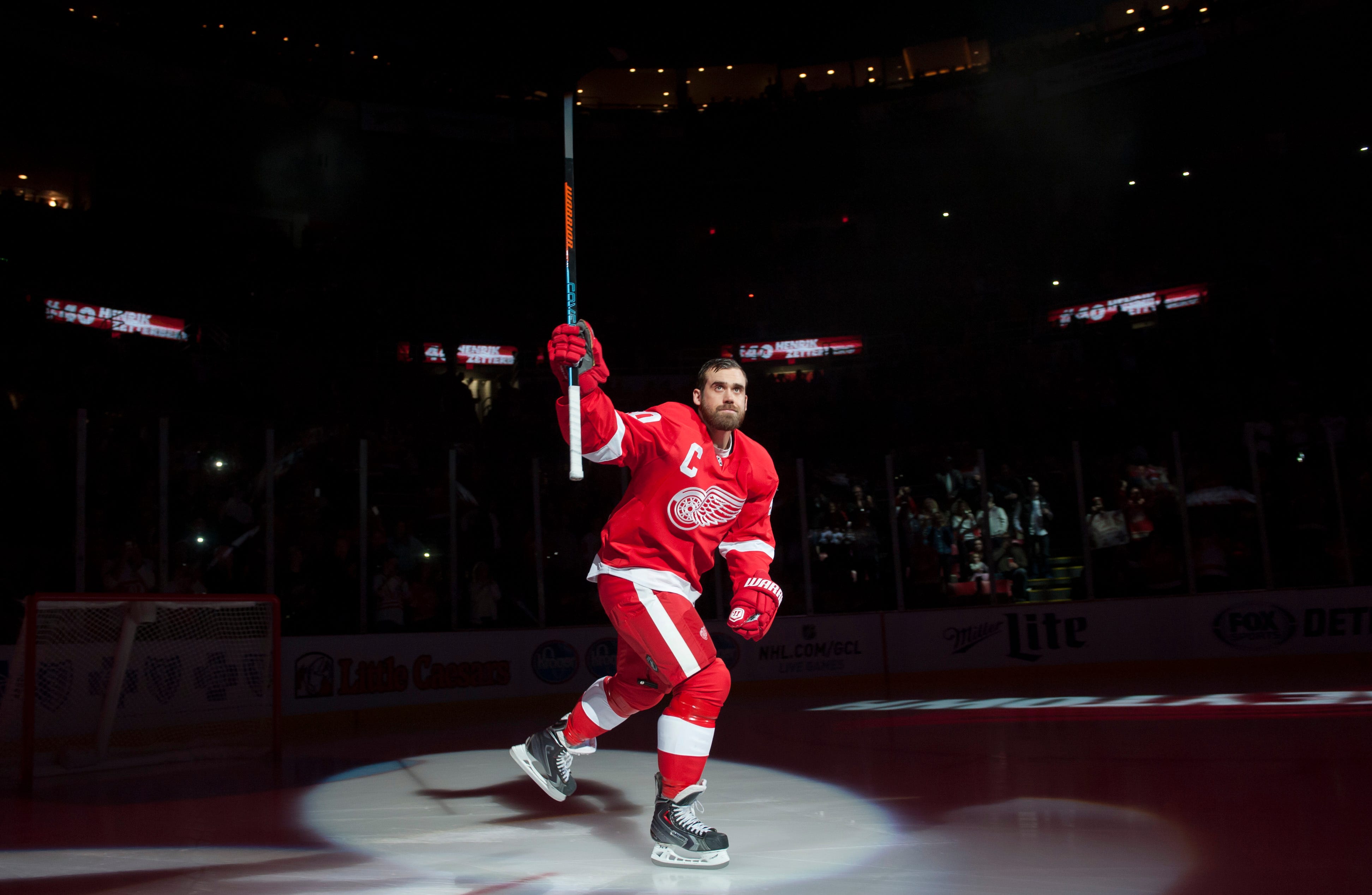Henrik Zetterberg, at ease in retirement, reveals details of injury
 Gregg Krupa
Gregg Krupa

Detroit – Henrik Zetterberg says he is happy, adjusting to retirement, attending Red Wings practices and games and beginning to occasionally look back at his career.
He emerged from behind the automatic doors of the Red Wings dressing room, smiling that easy, familiar smile, striding amiably along the lower concourse of Little Caesars Arena.
His unruly back, a condition that evolved over at least 12 years, spurring a variety of symptoms and dysfunctions, prematurely ended one of the handful of greatest careers in Wings’ history. But Zetterberg, 38, seemed sanguine.
Less than a month into his retirement, he reflected on his career, and he revealed new details of the evolution of a back condition that ended it prematurely.
Asked how he is adapting, he said, “I think it’s been good so far, you know? Obviously, it’s a bit early I would say.”
He has had some time to adjust.
“For me, I think even with the way that everything went down with the (retirement) announcement in Traverse City and all that, deep inside I knew, pretty much, last year,” Zetterberg said.
A quarter century ago in Sweden, a kid dealing with a growth stunt used the disadvantage of his size early to learn to possess the puck as if neither God nor man could displace it.
In Detroit, hard on the puck, he led the storied franchise to the Stanley Cup.
For significant periods, Zetterberg grappled with physical circumstances that eventually became disabling.

For 10 years, he also endured an occasionally fractious relationship with Mike Babcock.
“Maybe people think that we hated each other, sometimes,” Zetterberg said. “I won’t say we did that. But, there were times when we weren’t that friendly, maybe.
“We always had an honest relationship.”
His said his playing days came to an end when a degenerating disc eventually caused a nerve problem and a malfunction of a muscle that controls movement of the ankle.
It evolved for years. Zetterberg acknowledged he and the Red Wings did not disclose some central details.
“As a pro athlete, we keep a lot of stuff from the media,” he said. “So, I wasn’t completely honest with everyone.”
The back spasms he began experiencing in 2006, a few seasons into his NHL career, resulted from his muscles accommodating the weakening disc.
By 2014, the condition had deteriorated perilously. He left Sochi and the Olympics on stretcher, and within days had surgery on herniated discs.
After surgery to remove part of a disc rubbing on a nerve, he skated for the first time in Bloomfield Hills. On the first crossover to the left, Zetterberg said, when he attempted to push off with a skate, he felt nothing and went down.
He laughed at his memory of preparing to give the overworked Red Wings equipment manager Paul Boyer a hard time for bad skate sharpening.
But it was not the blade.
“That’s when we noticed the nerve that had shut down the small muscle down there, and that it couldn’t control the ankle,” Zetterberg said.
He said he played two 2014 playoff games against the Bruins with the ankle taped to prevent almost any movement. The Wings lost the series, 4-1.
“I played,” he said. “But I could not skate.
“At least we knew what to work on then.”
The problem, sometimes called "foot drop," occurs in non-athletes, too.
"At each level of the spinal cord, nerves come out through the vertebrae, and each nerve innervates sensory and motor functions," said Dr. Nick Moore, a sports doctor in family practice at the Detroit Medical Center. "And so, if the nerve is getting compressed, it can cause problems on down the line.
"It's not uncommon. It can be from a degenerative change, or it can happen acutely in an athlete if they have a stress fracture, or a herniated disc."
'One of the greatest'
The hard rehabilitation and conditioning went well. Zetterberg missed only five games the next season and played in every game the next three seasons, the last of his career.
But, in January, the nerve-related ankle problem returned.
Practicing stopped.

Zetterberg said he became aware the games in which he could play would be among his last.
“Walking around, I’m pretty good,” said Zetterberg, who must work out to maintain mobility.
“It’s when I’m skating. When I get on my blade, my ankle gives way.
“I can’t play hockey like that.”
Ken Holland said Zetterberg endured a lot, behind the scenes, to play hockey.
“From many years ago, he had back problems in 2008, 2006 even, he’s had to train incredibly hard year-round,” Holland said.
“It’s not as if the back issue just flared up, it was an ongoing issue. He had to make sure he worked hard on his core strength, and ultimately that is why he is one of the greatest Red Wings players in history, in addition to his incredibly impressive resume.
“When fans hear people around the team talk about a player, 'Oh, he’s a leader, he’s a competitor,' they only can see what’s on the ice,” Holland said. “There’s so much more that goes on behind the scenes that no one is privy to, because access is limited.
“One of the reasons he became a great player, a Conn Smythe Trophy winner, a Stanley Cup champion, a guy that carried the torch for this franchise for probably a decade, a guy who was eventually named captain of the Red Wings, is his commitment to be the best he can be on an everyday basis.
“It’s because of his passion, his will, his determination,” the general manager said. “He had all of those on top of hockey sense.”
At some point, spinal fusion seems like a likelihood, Zetterberg said. But, he works out, at home and in Little Caesars Arena, and says expects to lead an active life off the ice.
'You had to find a way'
The back, at long last, ended a brilliant playing career rooted in the Njurunda Sports Club in Sweden.
There, the comparatively late development of his body, before a growth spurt, gave him a few years of training against bigger boys.
He used them to develop the dominant puck possession skills that became his trademark.

“When I learned how to keep the puck to myself, that’s where it started,” Zetterberg said.
“I was always a small player playing against all big kids. I had to protect the puck ever since I was a kid, because I was so much smaller than them.
“They had muscles. I didn’t have the muscles.
“You put in a lot of hours,” he said, adding that keep-away games with club mates on free ice away from regular practices proved particularly helpful.
“And then, playing with men when you were 16, you had to find a way to protect the puck.”
He gained that experience in the Swedish Elite League, with Timra.
Jim Nill, the Wings former assistant GM, and Hakan Andersson, the director of European scouting, showed up at Timra to scout another player. Nill would famously say he kept noticing “this little Zetterberg guy who always seemed to have the puck.”
A few seasons later, Zetterberg traveled to Detroit to sign a contract.
On the trip, he sat in the stands in Joe Louis Arena with his parents and Niklas Kronwall during two games of the 2002 Western Conference finals, when the Red Wings defeated the Avalanche en route to their 10th Stanley Cup.
“That was my first taste of The Joe and the Red Wings,” Zetterberg said.
“We sat in normal seats watching that series, and I remember looking to Nick, who was going to play in Grand Rapids the next year, and saying, 'There’s no chance that I can play here, next year!’ Because, it went so fast.
“Everything was so loud. That series against the Avalanche was so hyped up, too, and the fans were so unbelievable.
“We were sitting there, like, 'Oh, boy…’”
He need not have worried.
His first season began six months later. When it finished, he placed second for the Calder Trophy, for rookie of the year.
Four years later, with Zetterberg playing a significant role, Sweden became the only team to win Olympic gold and the World Championship in the same year.
Surviving under Babcock
Since Njurunda, he learned how to play. In 2006, he learned to win at the highest levels.
He views the Red Wings’ 11th Stanley Cup win in 2008 as “the fruits of ’06 and ’07.”
“I think the teams that we had then, the core guys, we took a step every year,” he said.
“We had a great team. When you look back at the players we had then, it was amazing to be a part of.”

He recalls the persistence of the team in 2007-08, and the contributions of everyone up-and-down the roster and the good fortune.
He also recalls harsh disappointment of 2009, when he believes the Wings had a better team and “blew it” in the Stanley Cup Finals against the Penguins.
“That’s when you say, we should have had at least one more,” he said.
That was his fourth season with Mike Babcock.
Asked how difficult it was to play for Babcock, Zetterberg said, “He is difficult. And, especially if you had him for 10 years, you know?”
During those seasons, Zetterberg sometimes referred publicly to Babcock’s intensity and said they were candid with each other.
It could not have been easy.
“Any coach for 10 years would be hard,” Zetterberg said. “But then you add Mike into it. He puts a lot of pressure on guys. He wants you involved. He wants you to buy in.”
Babcock pushed players’ buttons.
“He found a way to push me into an 'I’m going to show you’ kind of thing. Not everyone, I think, can handle it,” Zetterberg said.
“He found a way to push the team in a way that we were always ready. But it took a lot from us, too, to always be ready.
“He put a lot into it, too. The preparation and how to approach the game was something that you see more now, in teams.
“My relationship with him has always been good. We butted heads a lot of times.
“I think he knew he could tell me whatever he wanted. And, I knew I could tell him whatever I wanted.
“And, somehow, it worked.”
Hockey in his future
Holland watched Zetterberg and Babcock, just as he had watched Steve Yzerman and Scotty Bowman.
“Mike Babcock was very demanding. He pushed his players on a daily basis,” Holland said, adding it is one of the reasons the Wings were successful.
“But, certainly, when you come to work every day and someone’s pushing you, pushing you, pushing you, sometimes you like to take a breather. And, Mike’s not letting you take a breather.
“It’s one of the reasons I respected Mike so much as a head coach.
“Certainly, as the captain, as the guy who represents the players and the organization, part of Henrik Zetterberg’s responsibility as captain was to represent the players and talk to the coach over the course of the season, and many seasons, about the issues at hand.
“You look at the success of the Detroit Red Wings with Mike Babcock as coach and Henrik Zetterberg as captain, pretty successful. Pretty successful!”
Zetterberg said he watches more hockey now than when he played. He intends to remain around the team and to be involved in hockey in the future.
“You want to leave the place in a good spot for the guys who are going to take over,” he said.
He will remain in Michigan much of the time.
“The fans have always been so nice to me,” he said. “You feel that, going around town.”